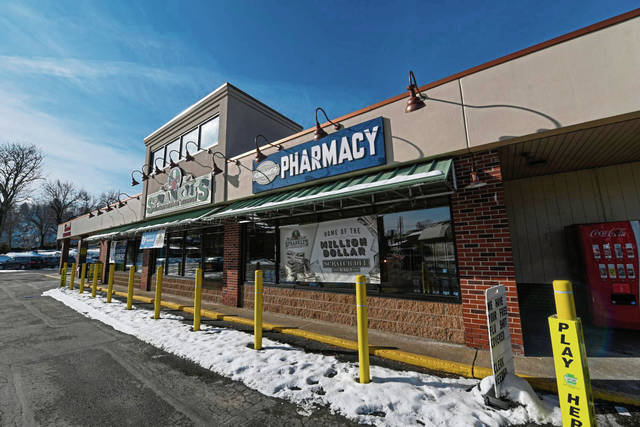The federal government has announced direct partnerships with pharmacy chains to speed up vaccine distribution, but pharmacists say independent stores are better equipped to administer doses quickly — and more efficiently.
Independent pharmacists in Western Pennsylvania say they have solid relationships with people scrambling to get vaccinated against covid. They say they’re most prepared to fill gaps that larger covid vaccine providers and the major chains miss.
“We have a connection to the community,” said Erich Cushey of Curtis Pharmacy, a small chain with locations in Washington and Fayette counties. “We know where these people are.”
Yet, two months into the rollout, community pharmacies are still struggling to receive regular vaccine allocations. They say they’re not getting adequate vaccine supply, while their waiting lists grow thousands of names long.
Cushey said he has more than 20,000 people on his covid vaccine waiting list. There are around 800 who live in local low-income senior high-rises that he’s prepared to inoculate now — but he doesn’t have the doses.
Previously, Curtis Pharmacy received roughly 2,000 in 10 days, he said, and all were administered within a week. But despite his store’s speed and efficiency in getting the vaccine out to eligible seniors, Cushey said he hasn’t received new doses in two weeks.
It’s almost got to a point when he thought he would have to reschedule appointments for people planning to receive their second doses.
The state is sending 1,600 doses this week for that purpose — right in the nick of time — but the pharmacy still won’t be able to inoculate anyone new until at least March, Cushey said.
State officials have repeatedly said vaccine supply is the greatest challenge in getting doses distributed quickly and consistently.
Last week, Acting Secretary of Health Alison Beam announced a list of new measures meant to streamline the process. One of those measures, Beam said, would be reducing the number of vaccine providers to 200 or 300 statewide, narrowing the effort to those who have demonstrated an ability to vaccinate people quickly.
She said that means some providers will start receiving fewer first-shot doses than they have been receiving, and that this is the most effective way to vaccinate the most people in the least amount of time.
“We’ve found that our hospitals and our health systems… our county and municipal health departments and our independent pharmacists have had demonstrated experience with their ability to move quickly and effectively with pushing first doses into the community,” Beam said.
Though pharmacies were identified as providers that will still be getting vaccine, some community pharmacists feel they’ve been getting too few doses. It can easily feel like efforts are undervalued in the allocation process, while big chains and hospitals seem to get their doses with relative regularity.
“If the state would look to partner with community pharmacies, we’re willing to go out in the community and give these shots for people who aren’t going to get out,” Cushey said. “I wish there’d be some recognition of who’s getting shots into the community.”
Cushey and other community pharmacists have found themselves responsible for inoculating residents of small personal care facilities, group homes and other at-risk populations that seem to have been overlooked.
Though most long-term care facilities opted into a federal partnership with CVS and Walgreens, many in Western Pennsylvania have yet to hear from the national chains to schedule first doses.
Dave Cippel, president of Klingensmith’s Drug Store with locations in Leechburg, Ford City and Kittanning, said his staff recently administered doses at a small personal care facility that had opted into the federal program but had yet to hear from the chain they were assigned.
Cippel said his pharmacy could easily distribute between 600 and 800 doses a week; three weeks ago, Klingensmith’s had received 1,100 doses and administered all of them in about a week. But like Curtis Pharmacy, Klingensmith’s also hasn’t received any doses in the last two weeks, leading management to cancel three clinic events that had been in the works for Clarion and Armstrong counties.
Klingensmith’s, too, has a waiting list — about 15,000 names long. The chain’s three locations are taking more than 100 calls a day, Cippel said, from people asking questions about the vaccine that he can’t really answer.
“Canceling these events is one of the most difficult things you have to do,” Cippel said. The events had been scheduled to take place in local fire halls. The spaces had been booked and word was already out in the communities. “A lot of people (were) very dependent on it.”
Brittany Miller, pharmacist at Roadway Pharmacy in Seward, said the store received its first 300 doses in late January. They arrived on a Tuesday and all 300 doses were administered by the end of the week.
Roadway requested a greater allocation for the next week, but only received 100 — which they administered in one day, in a four-hour time span.
Since then, they’ve gotten none.
Miller said Roadway has already scheduled second-dose appointments for the 300 people that were partially vaccinated three weeks ago. But next week’s allocation is still an unknown. It’s nerve-racking, she said, to not know if they’ll be able to provide those second doses.
“I feel like everyone is in the same boat,” Miller said — including the big chains. “I just think the state went too fast, too soon.”
With a more reliable vaccine allocation, Miller said she doesn’t see any limits to the number of people Roadway Pharmacy could inoculate.
She’s been approached by several volunteers with medical backgrounds who said they’d help administer doses, and local venues like schools and fire halls have offered their spaces for mass clinics.
“I think that’s just the difference in being a community store versus a big pharmacy,” she said. “We could do thousands of them, no problem. The problem is just getting it.”











